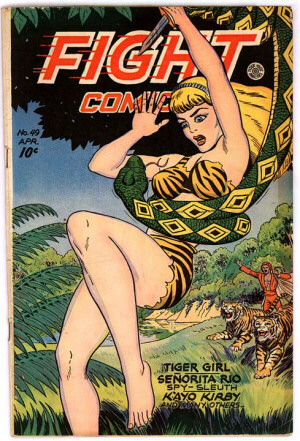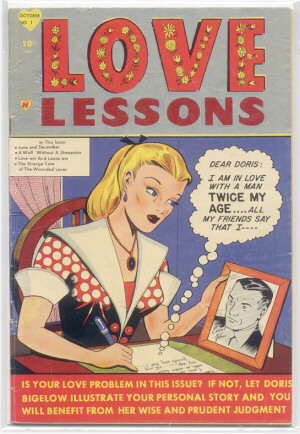Heart of Pinkness:
A Masculinist Encounter with Self-Help, Surface,
and The Grrl Genius Guide to Sex (With Other People) , p.2
The obvious problem with this “Self Help Novel” is that it is not a novel at all. and avoids any residual need for self-examination that might be concomitant with the genre. The cover flap introduces the author Cathryn Michon as “having written extensively for TV series including Sisters, South Park and Designing Women, and, more discouragingly, as a resident of Los Angeles. It becomes increasingly obvious as one reads inwards from the flap that this is a treatment for a television comedy that was never picked up by producers. The desperation of the last-ditch pitch meeting is almost palpable: “This Girl Genius thing is gold. It’s kind of a Sex in the City meets Dream On but for, like, network television, and get this, we’re calling the ‘girls,’ ‘grrls,’ reaching out to the billions of Courtney Love followers out there.”
 Stop me if this sounds familiar: a young divorcee in search of love in a heartless city gets in and out of trouble with the help of her friends, the members of the so-called “Grrl Genius” club, who are about as fierce and brainy as a pack of senescent hamsters. All the hallmarks of a B-list ensemble cast are there: there’s Kim, the hi-powered studio executive who smokes, drives an SUV and whose husband may or may not be trying on her underwear; there’s Vonnie, the blonde ex-sitcom star who signals her charming Southern wisdom with quaint homilies like ‘Hon, your soon to be ex-husband is as useless as a limp dick”; and finally, there’s Amelia, the red lace-lingerie wearing black bisexual-not-bisexual who is coping with isolation from Hollywood’s “L” community per her recent breakup with the improbably named lesbian talk-show host, Clarissa. Finally there is Jen, the protagonist’s cousin, who is supposed to add a little East Coast sophistication by dint of her Harvard sociology degree, part-time work at a sleazy diner and addiction to The Rules, that last bible of post-Feminist self-help literature.
Stop me if this sounds familiar: a young divorcee in search of love in a heartless city gets in and out of trouble with the help of her friends, the members of the so-called “Grrl Genius” club, who are about as fierce and brainy as a pack of senescent hamsters. All the hallmarks of a B-list ensemble cast are there: there’s Kim, the hi-powered studio executive who smokes, drives an SUV and whose husband may or may not be trying on her underwear; there’s Vonnie, the blonde ex-sitcom star who signals her charming Southern wisdom with quaint homilies like ‘Hon, your soon to be ex-husband is as useless as a limp dick”; and finally, there’s Amelia, the red lace-lingerie wearing black bisexual-not-bisexual who is coping with isolation from Hollywood’s “L” community per her recent breakup with the improbably named lesbian talk-show host, Clarissa. Finally there is Jen, the protagonist’s cousin, who is supposed to add a little East Coast sophistication by dint of her Harvard sociology degree, part-time work at a sleazy diner and addiction to The Rules, that last bible of post-Feminist self-help literature.
In the Guide… the segmentation of story into chapters serves no purpose other than to allow the author to print clever, epigrammatic relationship advice from eminences femmes such as Mae West and Gloria Steinem. Although worthy in their own right, these bon mots are no substitute for actual connective themes, insights, and character development. This is the disappointment of the book, that the writer – who pays lip service to feminist and proto-feminist icons such as West and Steinem, and who has her finger at least close to the pulse of popular culture – is unable to join these two in any meaningful way. In fact, she achieves the opposite – their almost complete dissociation -- because, despite the feminist flourish of “grrls” the book acts out (and hopes, for the sake of sales, that) the misogynistic assumption that women are, in fact, nothing more than petty consumers obsessed with appearance.
In the functional absence of chapters, we are left with the embarrassing transparency of the would-be episodes of the teleplay-cum-novel that lie across the chapter breaks. We imagine “Episode Two: Hosed,” in which the heroine’s dream-date with squadron of hunky firemen is spoiled by the exigencies of their marriages, the fatuousness of their dialectical abilities and their potbellies; “Episode Four: Salad Days,” in which heroine’s friend becomes the madrina of Encino to ensure that her salad – the “Grrl Genius Flamingly Passionate and Yet Ultimately Chicken Salad” – wins a cooking competition in the suburbs. The name of this dish, by the way, may be the cleverest bit of writing in the book. Helpfully its recipe is included, in yet another gimmicky ploy (among many) to stretch this concept out into a commercially acceptable book length.
 The main story thread that the viewer would be expected to follow over the course
of the fall season would be the divorce proceedings between Cathryn Michon
(the character) and her soon-to-be-ex Kurt Bremerhoffer, who suffers several
rounds of verbal emasculation at the hands of the narrator. He begins the
book as merely “German,” “Napoleonically short,” and “bald,” but makes a
strong finish as a closeted homosexual, a conclusion that Cathryn’s
“Grrl Genius” friends draw from the infrequency of their sex, “12 times
a year at best.” In fact Cathryn’s gay consigliere Tommy is the only male character in the story not to suffer emasculation, seemingly because in this author’s view gay men already have opted out of masculinity. Cathryn’s divorce lawyer, for example, is described as “Jabba the attorney” because he suffers the trifecta of being fat, bald and sweaty: “Jabba was silent, except for the steadily increasing drips of perspiration that cascaded off him.”
The main story thread that the viewer would be expected to follow over the course
of the fall season would be the divorce proceedings between Cathryn Michon
(the character) and her soon-to-be-ex Kurt Bremerhoffer, who suffers several
rounds of verbal emasculation at the hands of the narrator. He begins the
book as merely “German,” “Napoleonically short,” and “bald,” but makes a
strong finish as a closeted homosexual, a conclusion that Cathryn’s
“Grrl Genius” friends draw from the infrequency of their sex, “12 times
a year at best.” In fact Cathryn’s gay consigliere Tommy is the only male character in the story not to suffer emasculation, seemingly because in this author’s view gay men already have opted out of masculinity. Cathryn’s divorce lawyer, for example, is described as “Jabba the attorney” because he suffers the trifecta of being fat, bald and sweaty: “Jabba was silent, except for the steadily increasing drips of perspiration that cascaded off him.”
The attorney is important because apparently every television show now airing on American television must include some law-and-order element, and in this teleplay the climactic trial scene resolves Cathryn and Kurt’s custody battle for their Doberman Pinscher, Thor. I have always been suspicious about man-hating divorcees who name their big, black dogs after Norse thunder-gods, and as prospects in the story for human-to-human copulation became more unlikely, I found myself waiting with anticipation for the moment when Cathryn (the character) would finally consummate her lust for the poor animal. On page 100 she admits that “Thor missed me, and the truth was I was aching for Thor… I knew that if you can’t find a good man, you need to find a good dog.” By page 119 their connection is mutual and confirmed, “He was unwilling to be separated from me even when I peed and he insisted on watching me shower… Frankly, I was happy to have any male that excited to see me naked.” And by page 126 the relationship is all but consummated “It was a restless night for both of us, as Thor’s glee at finally being allowed up into a big human bed… made it impossible to sleep, as he didn’t want to miss a precious second of such a delectable and forbidden treat.” Bestiality hasn’t actually been a felony in California since around the time Roseanne Barr and Tom Arnold tied the knot, but Ms. Michon is still treading an awfully thin line. While I don’t want to marginalize canine-lovers, this transference of sexual desire onto an animal dependent on Michon as she refuses (rightly) to be dependent on any man, is surely not what she meant by other “people.”



Star Wars, George Bush, Judaism, and the Penis
Jay Michaelson
The So-Called Jewish Cultural Revolution
Leah Koenig
Witnessing Marshall Meyer
Josh Feigelson
We Will Destroy the Museums
Dan Friedman on Ashes and Snow
Clive Firestone
Nicole Taylor
Heart of Pinkness
Michael Kuratin
Archive
Our 670 Back Pages
Zeek in Print
Spring 2005 issue now on sale!
About Zeek
Mailing List
Contact Us
Subscribe
Tech Support
Links
From previous issues:
The Art of Enlightenment
Jay Michaelson
James Lee Byars and the Number Ten
Abi Cohen
Hipster Antisemitism
Jennifer Blowdryer & Alvin Orloff